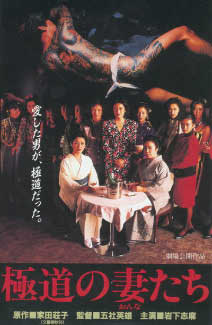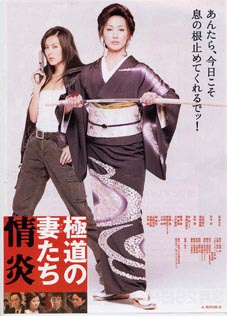Wives of the Yakuza (Gokudo
no Onna Tachi)

Japan is filled with oodles of films about the Yakuza detailing both
their misdeeds as well as their code of honor – but as the saying goes “Behind
every good man is a woman”. The same might be said about bad men and the
women behind them and this series of films tells their stories. Well-known
journalist Shoko Ieda spent a great deal of time with many of these wives
and she wrote a piece on them for a magazine that became the basis for a
long lasting series of films. The first film came out in 1986 and at least
ten more “Wives of the Yakuza” were produced from then through 1998 and yet
another installment is due out later this year (2005). So it appears that
this has been a fairly popular series of films to last this long. At this
time, as far as I know only the first two are available with English subtitles
though the next two in the series are out on DVD without subtitles.

The first two are enjoyable films as they fall somewhere between “The Godfather”
and “The Days of Our Lives” with equal servings of gang intrigue and soapy
melodrama with bite size amounts of action and nudity thrown in for good
measure. The films in the series are connected only by theme and the characters
generally do not cross from one film to another. The series also changed
directors on a constant basis from one film to the next with only a few instances
of a director doing more than one film. The image of a quiet wife waiting
for her man to come back after a hard day of extortion to rub his back and
make him tea is one that you should expunge from your thoughts – these are
often tough broads who exert a large amount of influence in the Yakuza world
– think Hillary Clinton – and they often take up the space that has been
evacuated by their husbands due to various reasons – death, jail or vice.

Two actresses in particular dominated many of these films though as different
characters in each of them. Shima Iwashita was already a well-known actress
when she appeared in her first “Wives of the Yakuza” in 1986. Married to
director Masahiro Shinoda, she had appeared in films since 1960 and had been
in a few classic ones – “Late Autumn”, “An Autumn Afternoon” from Ozu, “Red
Lion”, “A Ballad of Orin” directed by her husband, “The Demon” along with
many others. She was to appear in eight films in the series and often played
the implacable nerves of steel wife married to a high ranking Yakuza. Often
co-starring with her is Rino Katase who was to appear in eight films as well.
She wasn’t nearly as well known as her co-star and at least from the first
two films as evidence provides the majority of the sex appeal in the films.
Soft, curvy and vulnerable, she is the ying to Shima’s yang and is also more
than willing to shed her clothes.
Wives of the Yakuza
Director: Hideo Gosha
Year: 1986
Production Company: Toei
Running Time: 119 minutes
By the time of this film, Hideo Gosha was
perhaps past his samurai classics from the 1960s' and 70's but he is still
more than capable of spinning a complex tale of internecine fighting along
with a parallel story of two sisters at odds with one another. Gosha refuses
to rush the narrative and though it seems at times to be slowly paced, this
allows the various characters to be nicely fleshed out. In the final twenty
minutes Gosha finally turns the volume up to full and trots out three terrific
sequences in a row – the two sisters in a full on cat fight, another of a
torrid sex scene that ends with a wonderfully startling exploitation image (the image is of
an adult and spoiler nature) that takes in sex, nudity, guns and death and
finally an abrupt assassination. He leaves you wanting more and I initially
assumed the second film in the series would continue this exclamation mark
of an ending, but it didn’t. There seemed like a lot of room left for another
chapter in the lives of these two wives of the Yakuza.

While her husband is in jail, Tamaki (Shima Iwashita) fills in for him in
order to run his gang, the Awazu – they are a sub-gang of the Domoto Group
– the largest Yakuza family in Japan. She is primarily a businesswoman looking
out for their interests and expanding wherever possible. In fact, while her
husband has languished in jail the group has doubled their size and become
a formidable part of the Yakuza world. Most of this is due to her astuteness
and no nonsense attitude. She had once been the “number one girl in the pleasure
district” where she had met her husband and seen a good thing, but now past
her youth she is focused on maintaining a strong force for her husband to
come out to. She is very fair in her dealings and uses force only when necessary
and is willing to forgive transgressions if it serves her long term purposes
– but when the occasion demands it she will impose hard discipline on her
underlings – such as asking one of her men to lose a finger because one of
his club employees was selling drugs on the side. In her traditional kimono
garb, she cuts an impressive and formidable figure in the Yakuza world and
those who underestimate her due to her gender soon regret it. One time they
try and put a hit on her and she calmly reaches underneath her kimono and
pulls out a gun and shoots them - later that night she has the house of the
man who ordered the hit bulldozed with him and his family in it. Later she
forgives him when he pledges feality to her - under the demands of his own
wife.

Her sister, Makoto (Rino Katase), works as a bartender and lives with her
elderly father. She has no connection with the Yakuza world and prefers it
that way and has not seen her sister in many years. Though initially she
is the demure and shy type by the time the film is over her naked breasts
get more oohing and caressing than a newborn baby. She gets the attention
of many unwanted admirers including Sugita (Masanori Sera) a Yakuza creep
that she is warned by friends to stay away from.

The Domito Group is a loose confederation of various semi-autonomous gangs
and when the group head dies immediate strains begin to unravel it from within.
Unlike the secretive crime families in most countries, the Domito Group acts
like any other corporation by holding press conferences to announce the plans
of succession and the public follows their antics in fascination. The Horya
branch of this “corporation” isn’t pleased with the new successor and breaks
away – again announced formally to the press, but when the main family disagrees
with this it’s time to put away the public relations tools and pull out the
guns. Tamaki has allied her group with the main branch and tries to position
the Awazu to be top dog by the time the air has cleared and her husband is
released.

Tamaki also decides to intervene once again in her family’s life and tries
to arrange a worthy marriage for her sister who she desperately wants to
keep out of the Yakuza life, but on a short vacation in Guam Makoto runs
into Sugita and after he forces her to have sex she falls for him hook, line
and sinker – and him for her. His small gang though is aligned against her
sister in the gang war and the two sisters find themselves on opposite sides.
What is rather pleasing is that the relationship of Makoto and Sugita goes
against expectations – they really do love each other and he promises that
with her behind him he will become the “Capone of organized crime”. A sweet
promise to your wife and she happily takes up den mother duties to his gang.
This all leads methodically and intriguingly to the big bang finish that
Gosha gives us.

My rating for this film: 7.0
Wives of the Yakuza 2
Director: Toru Dobashi
Year: 1987
Production Company: Toei
Running Time: 119 minutes
The Yakuza wives and their children from
the Shigemune gang are going on a day outing to the beach and one of the
gang members organizes a treasure hunt for the children with items such as
guns and panties hidden about. The children are thrilled to find such “treasures”.
The Shigemune are a small group with only fifty men under their control in
the city of Osaka and their continued existence is based on tradition and
keeping a low profile. Takaaki who has inherited the business from his father
is a reluctant leader and leaves all of the day-to-day administration to
his wife Yuki (Yukiyo Toake) while he gambles and plays around with young
women. She is aware of this but seems content to allow him to do so and for
her to concentrate on gang business. Their marriage is a childless one –
she can’t abide children – but there is some underlying affection for one
another residing below the surface.

Takaaki has run up huge debts with his gambling and philandering, but Yuki
hopes to cover these with some land speculation around a new airport being
built. When a rival and much stronger gang, the Bandai Group, edges into
this profit center, Yuki begins to realize that her options are limited.
They are not strong enough to fight back even when some of their men are
killed and so she tries to use her wiles to keep her group together. The
other gang makes her a buyout offer – sell them her gang and name and they
will pick up her husband’s debts and give jobs to all her employees, but
she has one last hope. She has met a gambler, Ryoji (Hiroaki Kurakami), and
persuades him to go to a big game that the Bandai gang is running and to
bet their fortune on chance or more likely the slight of his hand.

Asami (Rino Katase) is a single mother trying to make ends meet by occasionally
modeling nude and other means. She desperately wants her son to get into
a good school, but her status of being a single mother is being held against
her. Her life is complicated even more when the Yakuza father of her son
comes back into her life. This is Ryoji and he promises to go straight, but
the Yakuza are out to make his life difficult or dead.

This has less flash than the first one and pours on the soap opera aspects
a bit heavily at times. There is very little action in this as it primarily
comes down to a drama consisting of the relationship between Yuki and her
errant husband, her attempts to navigate the dangerous world of the Yakuza
and then the relationship between Asami and Ryoji and the little triangle
that emerges from this. Though not exactly exciting the film still is compelling
in the manner in which the Yakuza are portrayed and these small lives within
that structure and its focus on a small weak gang and how it attempts to
survive in a world where bigger is definitely better.

My rating for this film: 6.0

(Yazuka Wives 2005)













